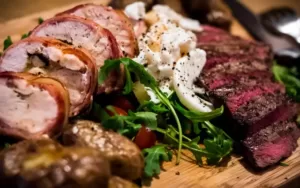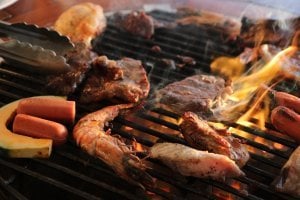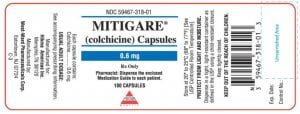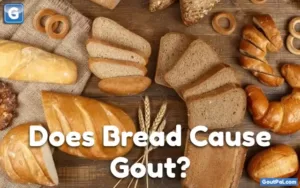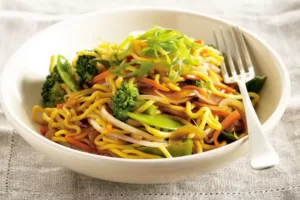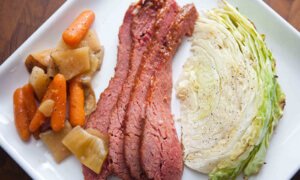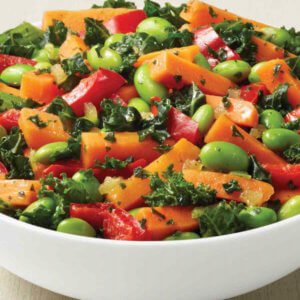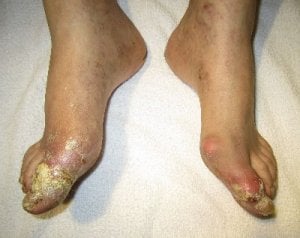An old discussion about gout and iron has been woken this week.
It is not really a topic that has ever gone away. Though not discussed in detail recently, I mention the relationship between excess iron and gout in many discussions. I also include it in many guidelines, including causes of gout in the Gout Symptoms guidelines, and gout foods to avoid in the Gout Diet guidelines.
Gout and Iron Revisited
For me, the turning point in recognizing the importance of iron for gout sufferers came when I heard about Facchini’s experiments with blood donation as a way to control gout. That research is cited in a more recent analysis of gout and iron. In a letter to the Rheumatology journal, Mascitelli, Pezzetta, and Goldstein offer a possible explanation of how iron affects uric acid and gout[1].
They believe that the key is inflammation, noting that it is the common link between iron overload and increased gout and heart disease. They refer to some interesting science explaining how uric acid binds with free iron, and exploring links between iron and inflammation. Their remarks include:
We propose that iron may represent a factor that triggers inflammation and heightens cardiovascular risk in gouty patients.
Accumulating evidence suggests that gout is a disease of iron overload. […]
Therefore, iron may represent an important biological link between gout and cardiovascular disease.
This, in turn, leads me to an interesting conclusion.
Vital Aspects Of Gout And Iron
The typical Western Diet is well known for it’s high iron content. I will cover this in more detail in separate articles, but we know that red meat is a rich source of iron. Coupled with iron-fortified foods, it is very difficult for many gout sufferers to exercise dietary control of iron.
The easy answer is to take uric acid lowering drugs such as allopurinol. A common cry in the gout forums, when people seek ways to lower uric acid through diet, is: “Take allopurinol, and you can eat what you like.”
Now we can see, there are real problems with uric acid lowering drugs as the only solution. It is vital to control uric acid as gout is a destructive disease. Left untreated, excess uric acid will destroy joints, and also damage all other organs including heart and kidneys. But, it is also vital to protect important organs from the ravages of iron overload. We need to find ways to control both uric acid and iron overload.
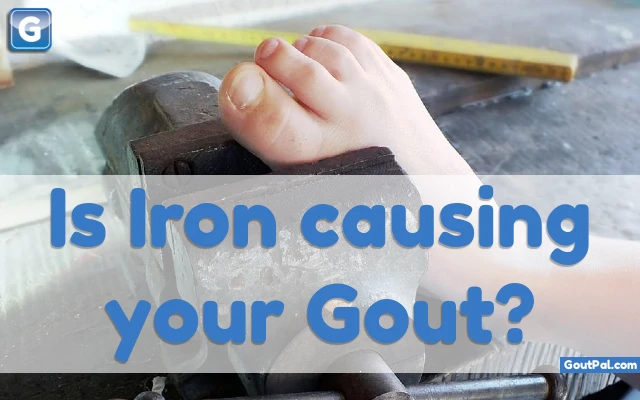
Your Gout And Iron
For some time now, I have advocated an alkalizing diet or a Mediterranean style diet as healthy options for gout sufferers. I will look at these again to ensure that they do not leave you at risk of iron overload.
Expect some gout diet updates regarding iron soon. In the meantime, please discuss gout and iron in the gout forum.
Leave Gout and Iron Revisited to browse Foods To Avoid With Gout guidelines
Gout and Iron Comments
GoutPal visitor responses and associated research include:
Gout and Hemochromatosis
We have discussed gout and hemochromatosis in the forums. As these are transient discussions, I won’t include a fixed link. However, you can easily find them using the search box near the top of every page.
Now hemochromatosis is another complication of an already complicated relationship between iron and gout. Elsewhere, I’ve looked at the complexities of iron, ferritin, and gout. Recently, that relationship has been investigated further[2]. Interestingly, with respect to hemochromatosis, the authors note:
Elevated serum urate is sometimes used as a cue to screen for hemochromatosis. […] (We are unaware of any studies investigating links between hemochromatosis and gout.)
Finally, the authors conclude that gout sufferers might be at risk from dietary iron:
Clinically, our data suggest that consideration of avoidance of iron-rich foods could improve flare avoidance advice given to people with gout.
So you should discuss the iron content of your diet with your doctor, dietitian, or other health professional.
Gout and Iron Related Topics
Please remember: to find more related pages that are relevant to you, use the search box near the top of every page.
Common Terms: iron, Most Helpful Gout Pages
Other posts that include these terms:
- High Alkaline Foods for Gout Diet Menu
- Gout Foods Table for Vegetables
- Gout Food List for GoutPal Foodies
- Foods High in Uric Acid Chart
- Purine Rich Foods
- Does Alcohol Affect Gout?
- Colchicine For Gout
Gout and Iron References
- Mascitelli, Luca, Francesca Pezzetta, and Mark R. Goldstein. “Comment on: Gout: an independent risk factor for all-cause and cardiovascular mortality.” Rheumatology (Oxford, England) 49, no. 7 (2010): 1421-2.
- Fatima, Tahzeeb, Cushla McKinney, Tanya J. Major, Lisa K. Stamp, Nicola Dalbeth, Cory Iverson, Tony R. Merriman, and Jeffrey N. Miner. “The relationship between ferritin and urate levels and risk of gout.” Arthritis research & therapy 20, no. 1 (2018): 179.
Please give your feedback
Did this page help you? If yes, please consider a small donation. Your donations help keep GoutPal's gout support services free for everyone.
If not, please tell me how I can improve it to help you more.
- YouTube
- The gout forums.

